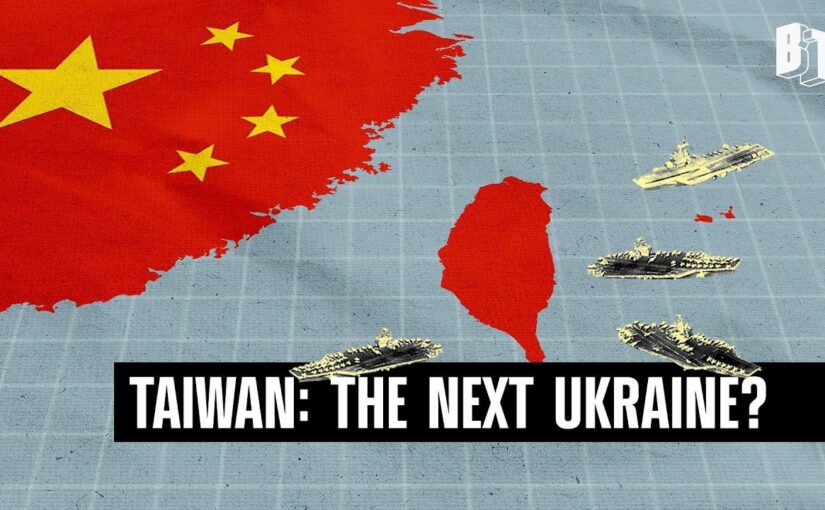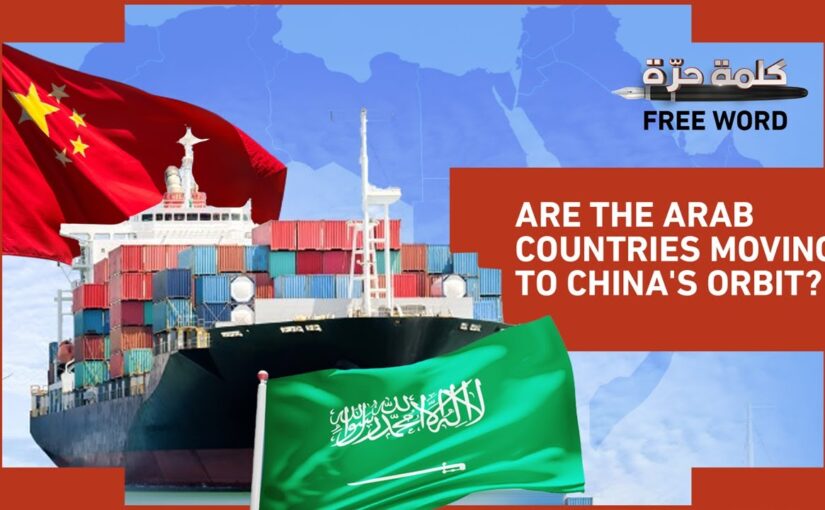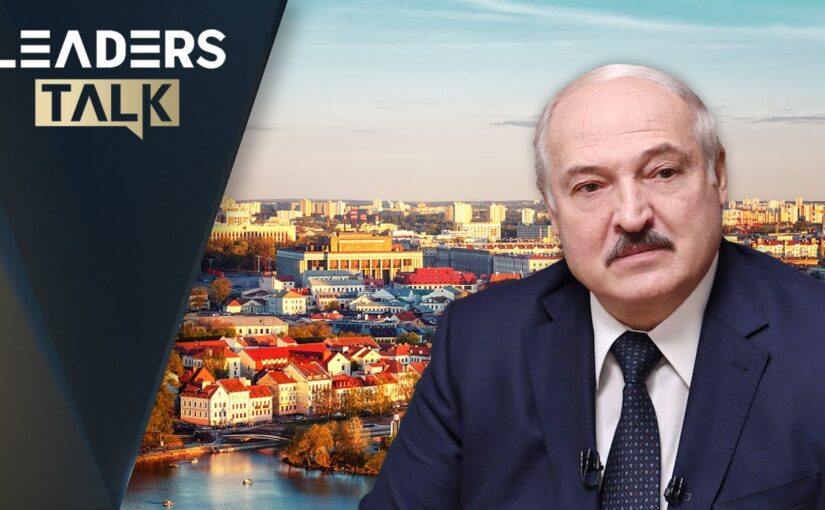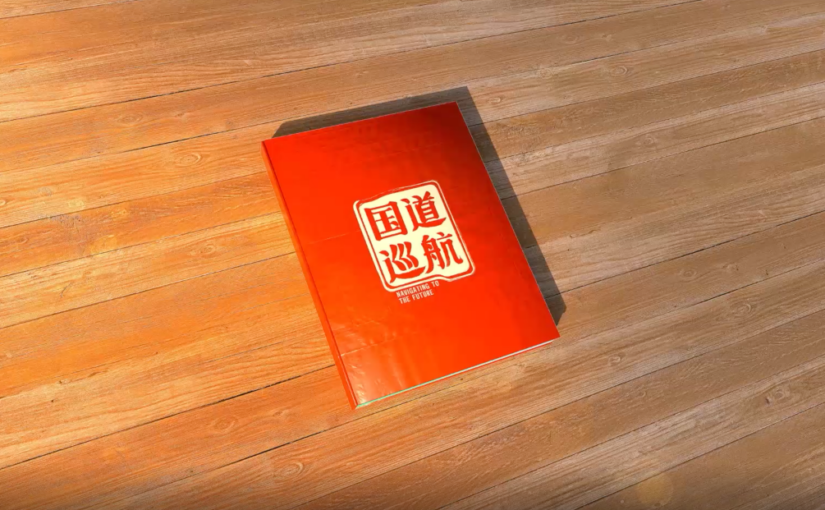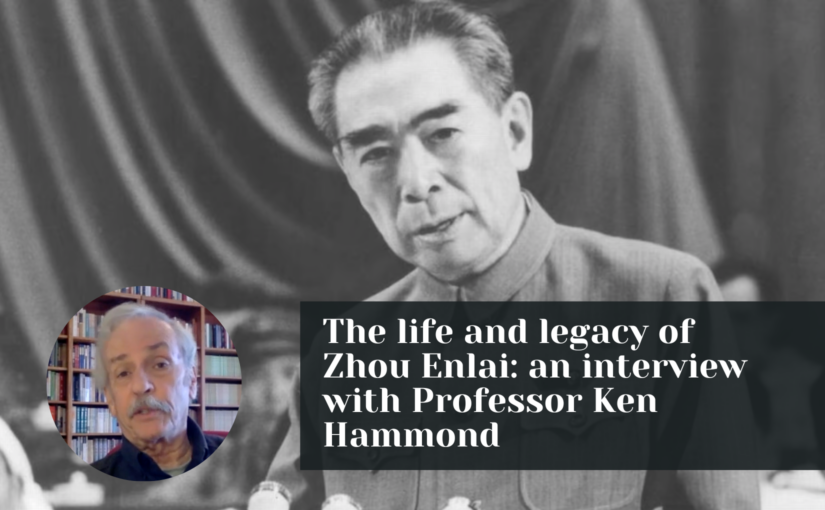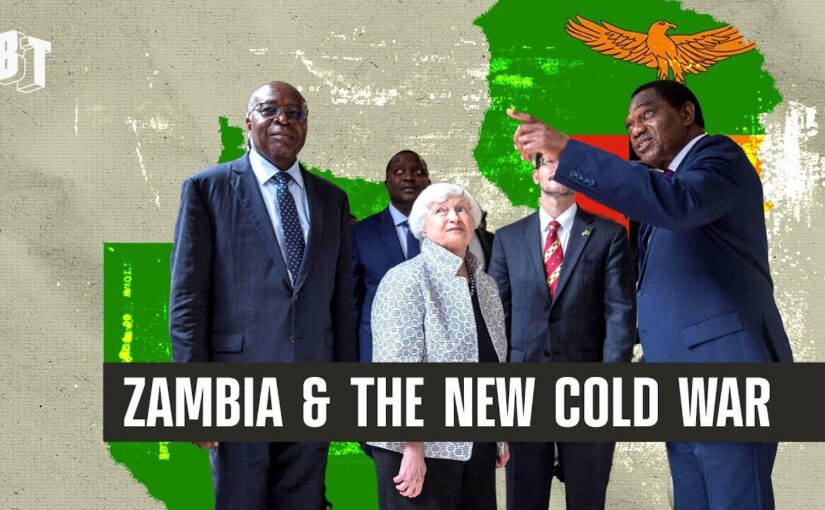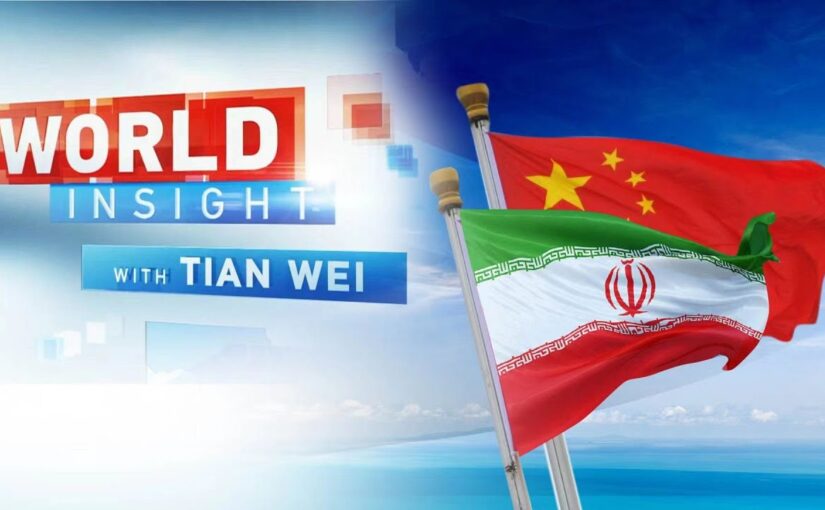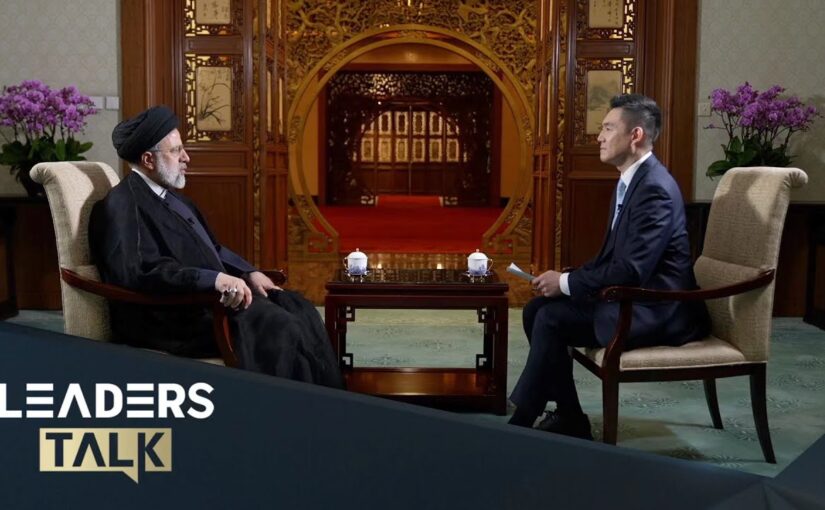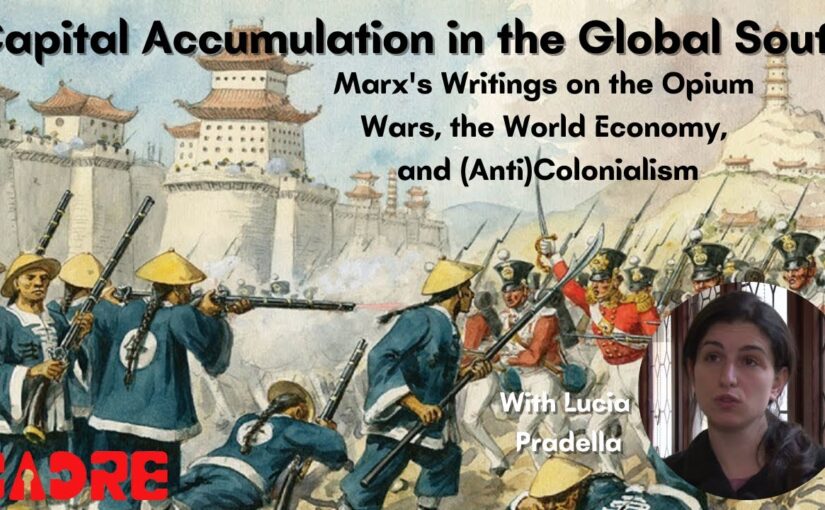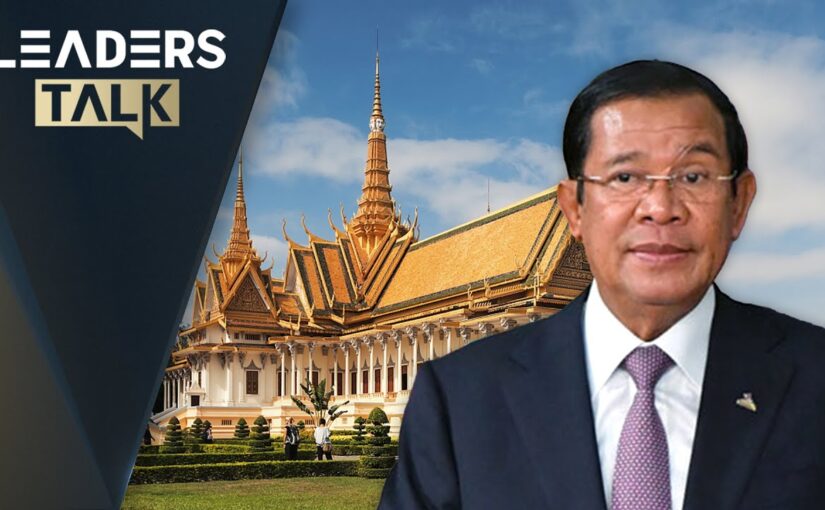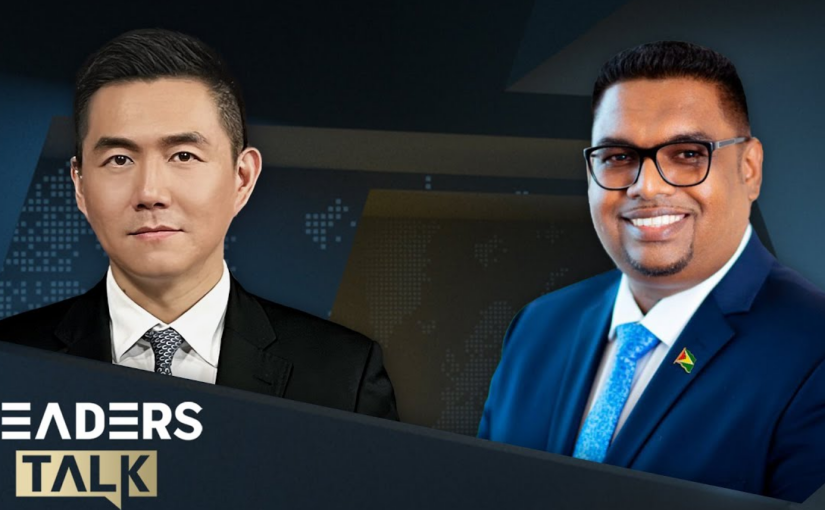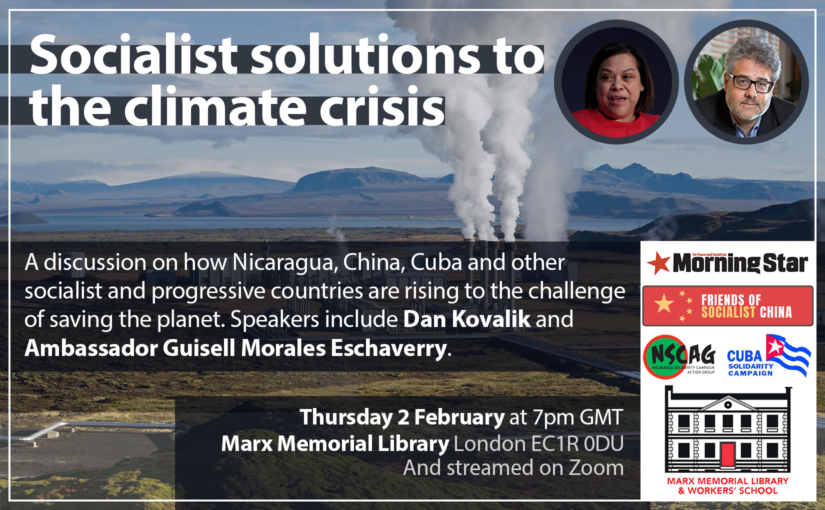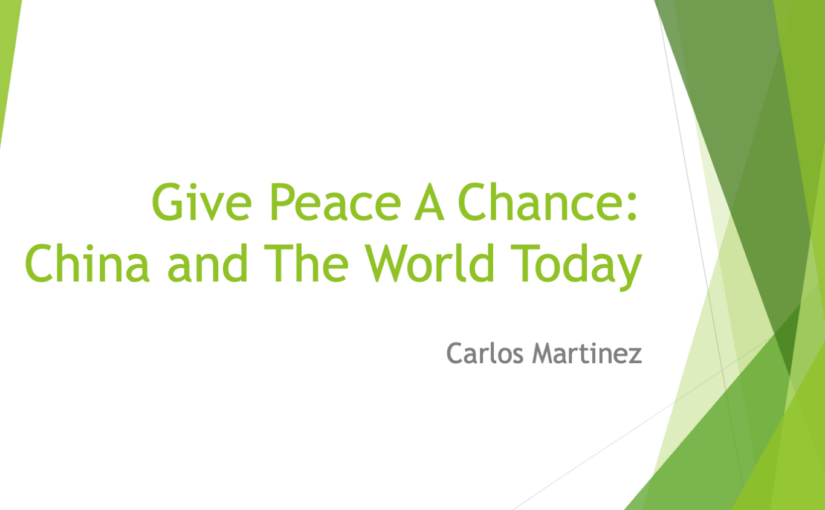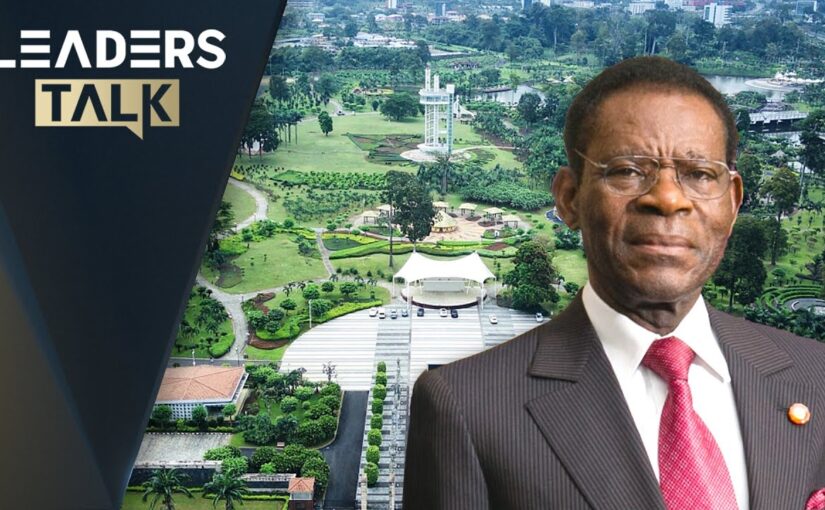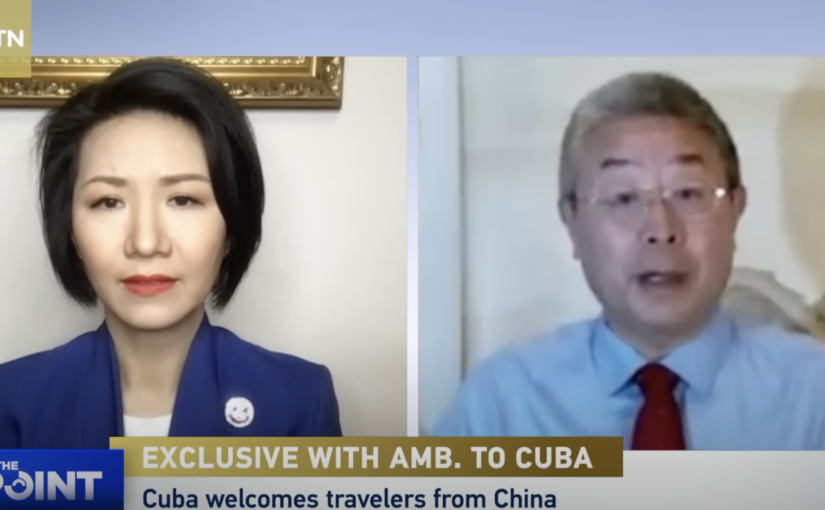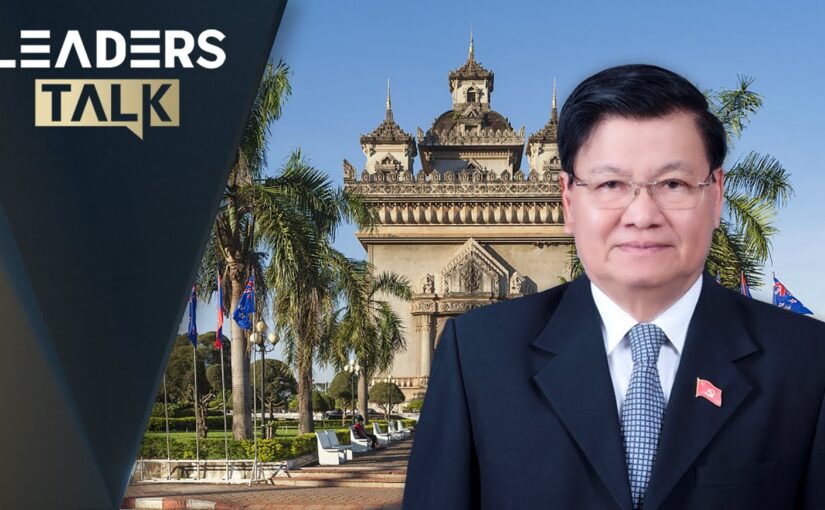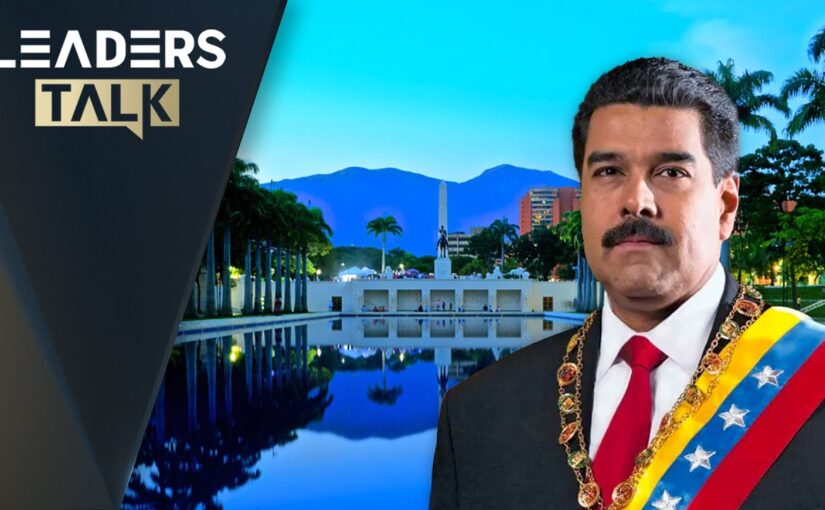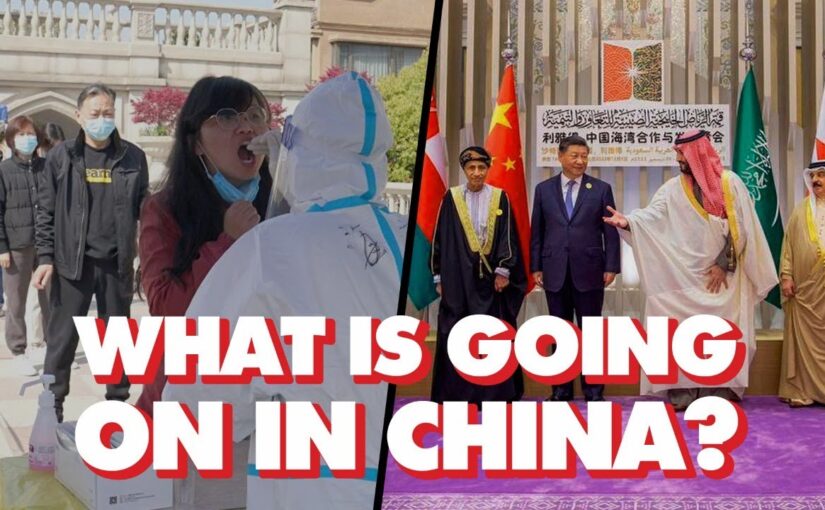Interviewed on BreakThrough News by Eugene Puryear and Rania Khalek, Professor Ken Hammond gives an extremely clear explanation of US policy in relation to Taiwan. Ken points out that the corporate media has reached fever pitch, encouraging the Western public to think that China is on the cusp of launching a military invasion of Taiwan Island; that this is a prima facie example of China’s disruption of the peaceful “rules-based order” that the US so benevolently presides over. This narrative functions to raise public support for a New Cold War, and to silence those voices making the rather obvious point that US-China cooperation over climate change and other global problems is both urgent and necessary.
Ken points out that China’s position in relation to Taiwan has not changed. China has always reiterated its commitment to a peaceful resolution of the issue, whilst maintaining its right to use force in the face of interference or any unilateral attempt by separatists to declare Taiwan’s independence. The issue is a fundamental concern of China: for hundreds of years, Taiwan has been part of China, and the only reason Taiwan is administered separately today is that the US Navy positioned itself in the Taiwan Strait following the victory of the Chinese Revolution in order to protect the remnants of the Nationalist regime and prevent national reunification under the CPC-led government in Beijing.
The US continues to provoke China over the Taiwan issue – and other issues – in the hope of triggering an incident that can be parlayed into a conflict which the US can somehow leverage to stall China’s development and its emergence as a major player in global affairs. Ultimately, Ken points out, this is done in order to protect US hegemony, and would certainly not benefit the ordinary people of the US. It’s a profoundly dangerous strategy which must be exposed and opposed.
The interview is embedded below.
Category: Video
Britain’s secret betrayal and repatriation of Chinese sailors after WWII
In this documentary, The Secret Betrayal, presented by Jamie Owen, CGTN exposes the racist deportation of thousands of Chinese seamen from Liverpool by the post-war British Labour government and movingly highlights the continuing and tenacious campaign for truth and justice being waged by their children and grandchildren.
One in seven of Britain’s merchant seamen, who manned the deadly Atlantic Convoys during World War II, were Chinese. Lauded as heroes in a 1944 government film, it was a different story post-war. Documents in the National Archives refer to the “compulsory repatriation of undesirable Chinese seamen”. They were “surplus to requirements” and to be subject to “bulk clearances”. Their wives and girlfriends, with whom many of them had young children, were dismissed as being “many of the prostitute class.” This racist and anti-working class disdain was doubtless compounded by many of the women in question being from Liverpool’s substantial Irish community.
In order to expel the Chinese seamen, the racist British state resorted to both subterfuge (such as changing the dates of ships’ sailings to allow deportation) and brute force, with Special Branch, Britain’s political police, brought in to round up people from shipping offices and cafés. Families were left with no idea what had happened to their husbands and fathers. And, according to legislation in force at the time, women who had married foreign nationals were deemed to have acquired “alien status”, with no rights to benefits or state support. As a result, many were left completely destitute. Families were further destroyed, with children given up for adoption and babies buried in unmarked, mass graves.
Left Labour MP Kim Johnson, a member of the Socialist Campaign Group, whose constituency includes Liverpool’s Chinatown, the oldest of its kind in Europe, has campaigned tirelessly for justice for the victims of this racist injustice. She tells the programme that it is not just a matter of securing an apology from the present Conservative government. This happened under a Labour government, and “to have a level of acknowledgment from our own party would be a step in the right direction.”
Looking at reasons for the deportations, the presenter notes, showing contemporary footage of Unite leader Sharon Graham addressing a workers’ meeting, that the Liverpool dockers have a long history of industrial militancy. The Chinese sailors were paid less than their white counterparts and denied bonuses until a strike led by the Liverpool Chinese Seamen’s Union in 1942. An excellent article by Dan Hancox, published in the Guardian in May 2021, describes the union as “Communist-affiliated”, adding that “the Shangainese Blue Funnel [a major shipping company that employed only Chinese seamen] crew were mostly active Communists and trade unionists.”
The Labour government responsible for these actions is lionised by much of the left for its creation of the NHS and a welfare state. But this racist crime was not the only one of which it was guilty. The ‘Windrush scandal’, for example, did not begin with Conservative governments of the last decade. Coinciding with the ship docking from Jamaica at Tilbury on June 22, 1948, 11 Labour MPs wrote to Prime Minister Clement Attlee, stating that: “This country may become an open reception centre for immigrants not selected in respect to health, education, training, character, customs and above all, whether assimilation is possible or not. The British people fortunately enjoy a profound unity without uniformity in their way of life, and are blest with the absence of a colour racial problem. An influx of coloured people domiciled here is likely to impair the harmony, strength and cohesion of our public and social life and to cause discord and unhappiness among all concerned.”
Attlee could only reply: “It is too early yet to assess the impression made upon these immigrants as to their prospects in Great Britain and consequently the degree to which their experience may attract others to follow their example. Although it has been possible to find employment for quite a number of them, they may well find it very difficult to make adequate remittance to their dependants in Jamaica as well as maintaining themselves over here. On the whole, therefore, I doubt whether there is likely to be a similar large influx.”
This same Labour government, as Keir Starmer never fails to remind us, was also central to the creation of NATO, and enthusiastically waged anti-communist and colonial wars in Greece, Malaya, Korea and elsewhere.
The CGTN documentary is embedded below.
Video: Are the Arab countries moving into China’s orbit?
In this episode of Kalima Horra, the discussion program hosted by George Galloway on Al Mayadeen television, our Co-Editor Keith Bennett discusses recent developments in the relations between China and the Arab countries and their background. In response to George’s opening observation that the tectonic plates are shifting in the region, Keith draws attention not only to the success of President Xi Jinping’s visit to Saudi Arabia last December, which saw the first summit meetings between China and both the Gulf Cooperation Council and the League of Arab States, but also to the long history of relations between China and the Arab world, including China’s solidarity with the Palestinian revolution from its inception.
In response to a question as to how China can balance its relations with, for example, Saudi Arabia and Iran, Keith notes that China does not establish relations with any nation at the expense of a third country and that it always stresses the common interests of the developing countries, which it considers more important than their differences. Under such circumstances, it is becoming more difficult for the United States to pick off the Arab countries one by one. The US pursuit of a New Cold War, against China, Russia, Iran and some other countries. Keith notes, is serving to increase the coordination among the developing countries, with ever greater interest being expressed in such bodies as the Shanghai Cooperation Organization (SCO) and the BRICS grouping.
Keith was joined in the studio by Shahid Dastgir Khan, a former student leader in Pakistan and now a human rights lawyer in Britain, and Joseph Robertson, the Strategic Director of the Orthodox Conservatives group; and by video link by Dr. Alessandro Arduino, Principal Research Fellow at the Middle East Institute of the National University of Singapore and an Associate at the Lau China Institute of King’s College London, and by Dr. Einar Tangen, a Senior Fellow at China’s Taihe Institute, based in Beijing.
Dr. Tangen said that, due to its rogue state behavior, the United States had worn out its welcome in the Middle East. Its colonial arrogance and lecturing of others does not work anymore. And Shahid Khan recalled that Pakistan-China friendship was something he clearly remembered right from his childhood. Pakistan, he noted, had played a part in helping draw Saudi Arabia and the United Arab Emirates (UAE) closer to China.
The full discussion is embedded below.
Lukashenko: We do not want war, West blocking peace talks
Belarus President Alexander Lukashenko paid a state visit to China from February 28 to March 2. Just prior to the visit, he gave an exclusive interview to Li Tongtong of CGTN in his capital Minsk as part of the Chinese channel’s impressive Leaders Talk series.
Their extensive discussion began with the conflict between Russia and Ukraine and its impact on Belarus. President Lukashenko said that he fully agreed with President Putin that the root cause of the problem is not to be found in Russia. He recalls the 2014-15 diplomatic process in the Belarus capital, which had culminated in the signing of the Minsk Protocol. However, former German Chancellor Angela Merkel and former French President François Hollande had both now admitted that they had engaged in this process in order to give Ukraine more time to prepare for war. It is therefore clear who wanted conflict.
Belarus, Lukashenko insisted, is a peace-loving country. Its people know what war means. Belarus lost one third of its population in World War II. Belarusians do not want war with anyone, but especially not with Ukraine, whose people are their kin. President Lukashenko noted that his own forebears hailed from Ukraine. Despite all this, the western powers are trying to drag Belarus into the conflict. As Belarus has long frontiers with both Poland and Lithuania, this would mean that the country would be directly facing NATO, which would force it to disperse its forces and therefore become more vulnerable to attack. The President insisted that whilst his country did not want war, it was ready to defend its sovereignty and independence.
In the ongoing conflict, it is the United States and the western powers that are obstructing peace talks. Russia proposed negotiations from the very beginning and they were held in Gomel, the second largest city of Belarus, right back in February 2022.
Lukashenko praised President Xi Jinping’s Global Security Initiative (GSI), noting that only peace can lead to prosperity for humanity whilst war leads to catastrophe. Extolling his personal and political friendship with the Chinese leader, he said that he and his family were very excited by Xi’s re-election at last October’s 20th National Congress of the Communist Party of China. He praised Xi’s ability to draw on the experience of his predecessors while injecting new meaning into it.
The program also highlighted the development of the Great Stone Industrial Park, the key focus for Belarus-China cooperation, which President Xi had visited when he travelled to Belarus in 2015. The park has developed rapidly is now one third of the size of Minsk. Lukashenko stressed the importance of synergizing the work of the Belt and Road Initiative (BRI) with that of the Eurasian Economic Union (EEU), whose full members currently comprise Armenia, Belarus, Kazakhstan, Kyrgyzstan and Russia. He further stressed that the friendship between Belarus and China would last not just for his tenure in office but for ever. He described this belief as having become deeply ingrained in the hearts of the people of Belarus. Especially during the period of sanctions imposed by the West, the people of Belarus had become very clear as to who were their enemies and who were their friends.
Towards the end of the interview, he highlighted education, culture and sports as among the areas where he would like to see even more cooperation and exchange with China and noted that his youngest son is currently studying at university in Beijing.
President Lukashenko also touched on a number of other issues, including the US shooting down of an unmanned Chinese airship, its instigation of ‘color revolutions’ not only in Belarus but in the Arab countries, and the relations between the European countries, the United States and China.
The full interview is embedded below.
Chinese documentary: Navigating to the Future
Embedded below are the five parts of a new documentary called Navigating to the Future, produced by the Information Office of the International Department of the CPC Central Committee, and introducing China’s path to modernization. The documentary tracks the cities and scenic sites along National Highway 318 – China’s longest national highway, running from the far east (Shanghai) to the far west (Zhangmu, on the China-Nepal border). The film includes a range of images and scenes from contemporary China, and provides a valuable insight as to the Chinese people’s journey of building a modern socialist country.
Episode 1: Stopovers at thriving markets
Episode 2: Stopovers at prosperous villages
Episode 3: Stopovers at a smart city
Episode 4: Stopovers at pristine mountains and waters
Episode 5: Stopovers at the fashionable plateau
The life and legacy of Zhou Enlai: an interview with Professor Ken Hammond
To mark the 125th anniversary of the birth of Zhou Enlai – one of the top leaders of the Chinese Revolution, and Premier of People’s China from 1949 until his death in 1976 – we conducted an extensive interview with Professor Ken Hammond about Zhou’s life and legacy.
The interview covers Zhou Enlai’s formation as a revolutionary; his role in the early years of the Chinese Revolution in the 1920s; his working relationship with Mao Zedong; his contribution to Marxist understanding of socialist foreign policy; his role in establishing links of solidarity between China and Africa; his role in the negotiations with Henry Kissinger and Richard Nixon that brought about the start of a rapprochement between the US and China; his experiences in the Cultural Revolution; and his lasting legacy, both in China and globally.
Ken Hammond is a professor of East Asian and Global History at New Mexico State University, founding director of the Confucius Institute at New Mexico State University, and an activist with Pivot to Peace. He’s also a member of the Friends of Socialist China advisory group, and is working on a biography of Zhou Enlai. He is interviewed by our co-editor Carlos Martinez.
Fred M’membe: It’s the US, not China, that threatens African sovereignty
In this powerful interview on BreakThrough News, Fred M’membe (leader of the Socialist Party of Zambia) explodes the myth of Chinese colonialism in Zambia. He states: “China has never threatened our independence. We’ve never been subjected to any form of mistreatment or exploitation by China, but we can’t say the same about the US.”
M’membe recalls that China was a key supporter of post-liberation Zambia, providing both economic aid and military equipment to defend against the attacks of the apartheid regime in South Africa. He says that Zambia turned to the US for support but was turned away; China was a true friend, even making enormous sacrifices to build the Tazara Railway, which was essential for the country’s development.
He compares the US’s strategy of domination with China’s strategy of solidarity and friendship: “The US supported the apartheid regimes in South Africa and Rhodesia. The US has been involved in reactionary coups and assassinations all over Africa, including the assassination of Patrice Lumumba, the overthrow of Kwame Nkrumah, the assassination of Muammar Gaddafi. China has never participated in any coup, has never killed an African.”
Referencing the accusations of a “Chinese debt trap”, M’membe points out that China only holds 10 percent of Zambia’s debt. And what have Chinese loans been used for? Hydropower stations, airports, roads, water systems, hospitals, schools, government buildings. “The debt problem we have is the debt we owe to Western institutions, that’s 70 percent. The China debt trap narrative is a lie.”
China and Iran standing together against hegemonism
Ebrahim Raisi becoming the first Iranian head of state to visit China in two decades, at a time of significant regional and global changes, has naturally aroused considerable attention and comment. We reproduce below two discussions in which experts offer their analysis regarding the visit and its likely outcomes.
In an episode of CGTN’s World Insight, presenter Tian Wei is joined by Rong Ying, Vice-President of the China Institute of International Studies; Sadegh Zibakalam, Professor at Tehran University; and Abas Aslani, Senior Research Fellow at the Centre for Middle East Strategic Studies.
Aslani notes that Iran’s full membership in the Shanghai Cooperation Organisation (SCO) sets the scene for a convergence among Asian powers facing US and western pressures. It is the first regional bloc that Iran has joined since the revolution. Professor Zibakalam notes that, within its region, Iran has troubled relations with Saudi Arabia, the United Arab Emirates (UAE) and Israel. China, he says, can play an important role in bringing Iran, Saudi Arabia and the UAE closer together.
Rong Ying was optimistic that the two countries can find ways to cope with the sanctions imposed by the United States, for example by trading in their national currencies. Iran and China are both opposed to the sanctions, he points out. They are illegal and cause untold suffering to the people. However, they force countries to find ways to develop, which is not what the USA intends. He further notes that the JCPOA (Joint Comprehensive Plan of Action or the ‘Iran nuclear deal’) is endorsed by the UN Security Council and must be implemented. He regrets that the Biden administration has gone back on its word and has failed to rescind Donald Trump’s reneging on the agreement. Iran, he notes, has the right to peacefully develop and use nuclear energy.
The Chinese scholar also forcefully points out that both Iran and China are civilisational countries working together. The significance of this goes beyond the bilateral. Both countries oppose unilateralism, hegemony and bullying. And they treasure sovereignty, territorial integrity and the pride of being an independent nation.
Also, in an episode of Spotlight on Iran’s Press TV, Arnold August, a Montreal-based author and journalist, is joined by John Ross, Senior Fellow at the Chongyang Institute of Financial Studies.
Arnold explains that the strengthening of Iran/China relations is a fitting riposte to the racist denigration of Asian peoples and civilisations by the imperialist powers. He notes that the United States and major western powers simply cannot compete, despite their protestations to the contrary, with such Chinese-initiated projects as the Belt and Road Initiative (BRI), which advance the struggle for a multipolar world. As an example of the increased confidence of the anti-hegemonic forces, he drew attention to the recent Global Times editorial, entitled: ‘Welcome President Raisi. China, Iran no need to watch attitude of US, West.’
John explains that the issue is not that other countries wish to confront the United States. It is that the United States acts against the interests of other countries. The US is suffering defeats in economic competition with China. It also expected Iran and Russia to collapse as a result of sanctions. This has not happened. And the overwhelming majority of the world does not go along with the western sanctions on Russia. However, the danger in this situation, John notes, is that the United States may resort to military means to pursue its objectives.
Both programmes are embedded below.
President Raisi: Iran and China share a deep friendship
In this episode of the CGTN series Leaders Talk, Wang Guan goes to Beijing’s Diaoyutai State Guest House to interview Iranian President Ebrahim Raisi during his recent visit to China.
The Iranian President notes that the two countries share a deep friendship, both being ancient Asian civilisations with rich histories and now sharing common positions and interests. China and Iran, he notes, both believe in maintaining independence, but some countries do not want to see them grow stronger. However, their mutual cooperation is increasing, whether in the fields of economy and trade, or through joint participation in such multilateral bodies as the Shanghai Cooperation Organisation (SCO), which Iran recently joined as a full member. President Raisi’s meeting with President Xi Jinping was their second in six months, following the SCO Summit in the Uzbek city of Samarkand.
The interview devotes considerable attention to the United States’ illegal and unilateral sanctions against Iran. These were not eased even during the worst days of the Covid-19 pandemic. Raisi describes the sanctions as “incredibly cruel”, with no fundamental difference from outright military aggression. With essential medicines, for example those needed by cancer patients, and Covid-19 vaccines, embargoed, Iran has successfully developed its own vaccines, both in cooperation with other countries and independently, and has now become a net exporter. Seventy per cent of Iranians have been vaccinated, with help from China playing a crucial role. Noting that Iran has been under US sanctions for over four decades, and under eight US Presidents, Raisi notes that they expected the Iranian government to fall, but they are the ones who have departed one after another. Biden had claimed to oppose Trump’s Iran policy, but his own policy once in office has proved to be no different.
The Iranian leader expresses strong support for Xi Jinping’s signature policies of the Global Development Initiative (GDI) and the Global Security Initiative (GSI), which he sees as necessary due to the fact that US hegemony and its cronies are responsible for wars and bloody conflicts around the world. Some developed countries, he says, only pay lip service to promoting development while oppressing people in other countries and even their own people. China makes commendable and determined efforts to lift all people out of poverty while in some other countries only two or three per cent of the people benefit from government policies.
Marx’s writings on the Opium Wars and capital accumulation in the Global South, with Lucia Pradella
In the interview below, Lucia Pradella engages with Joseph Mullen of The Cadre Journal on the subject of Karl Marx’s understanding of colonialism and capital accumulation in the Global South, with particular reference to China.
Dr. Pradella is a Senior Lecturer in International Political Economy at King’s College London and the author of ‘Globalization and the critique of political economy: New insights from Marx’s writings’, published as part of the Routledge Frontiers of Political Economy series. The Cadre Journal is a student-run journal and podcast on anti-imperialism and communism.
Lucia explains how in her study for her master’s and PhD degrees, as well as a period spent working on the major project to publish the Complete Works of Marx and Engels, she acquired greater understanding of the breadth and depth of Marx’s studies of pre-capitalist societies and of the central role played by colonialism, and not least the Opium Wars, in primitive capital accumulation and his value theory. Whilst greater attention has tended to be paid to Marx’s writings on India, it is significant that Marx’s positive attention to, and appraisal of, the first stages of the Taiping Revolution essentially coincides with the defeat suffered by the European revolutions of 1848. Arising from his study of the Taipings, Marx postulated the possibility of a republican revolution in China.
In the Communist Manifesto, she notes, Marx and Engels proceeded from the premise that the industrial proletariat of Europe constituted the agency of the international revolutionary process, but developments post-1848 created two possible paths to revolution, on the part of the industrial proletariat and on the part of the colonised peoples. However, she contends that Marx did not abandon his view that a developed capitalism was necessary for there to be a socialist revolution.
The views and contributions of a range of people, including Rosa Luxemburg, David Harvey, Immanuel Wallerstein, Giovanni Arrighi, Andre Gunder Frank and Samir Amin are touched on, with Lucia arguing that the dependency theorists and proponents of world systems theory overlooked some aspects of Marx’s Capital. Asked for her views on the theory of combined and uneven development, and its applicability, she expresses the view that Trotsky did not understand the centrality of colonialism in Marx’s analysis.
Noting Marx’s acuity with regards to the potential impact of developments in China on the world economy, she says that some of the developments we see today are processes that Marx already analysed at a very abstract level in Capital Volume One.
The full interview is embedded below.
Interview with Hun Sen: No one can replace China
In this edition of the CGTN series Leaders Talk, Zou Yun travels to the Cambodian capital Phnom Penh to interview Prime Minister Hun Sen just prior to his recent visit to China.
Noting that he will be the first foreign leader to visit China following the Spring Festival, and that he was the first to visit China three years ago during the Covid pandemic, Hun Sen recalls that at that time he, “felt the need to stand in solidarity with the Chinese people” and also to reassure Cambodians living and studying in China.
His expectations this time were particularly focused on deepening economic cooperation, not least through the free trade agreements of both Cambodia and the ASEAN regional bloc with China as well as the Regional Comprehensive Economic Partnership (RCEP).
Lauding China’s comprehensive contribution to Cambodia’s infrastructural development, Hun Sen firmly stands by his earlier statement, “who can I rely on if not on China?” “I have made it clear and will continue to say it…Who can replace China? They [Cambodia’s critics] do nothing, but question us instead.”
China’s development, he points out, “brings benefits to the whole world.” Some countries, he notes, press Cambodia to follow their political path, but he refuses this. “Though poor and underdeveloped, Cambodia has its dignity…Some countries threaten and impose sanctions on us, but I am confident that China will never do such a thing to us.”
Describing President Xi Jinping as a great leader, Hun Sen says that the Chinese leader’s concepts of a Global Development Initiative (GDI) and a Global Security Initiative (GSI) are “truly visionary.” If they were to be universally adopted, the world will “become a harmonious community without fear of war.”
The full interview is embedded below.
President of Guyana: Sino-Guyanese relations are imperishable, based on shared ties of blood and history
In this edition of the CGTN series Leaders Talk, Wang Guan interviews Dr. Mohamed Irfaan Ali, President of Guyana. The only English-speaking country in the South American mainland, for reasons of historical and cultural background, Guyana is also considered a part of the Caribbean. In 1972, Guyana became the first country in the English-speaking Caribbean to establish diplomatic relations with China. And in 2018, it became the first country in South America to join China’s Belt and Road Initiative (BRI).
But whilst China and Guyana have enjoyed just over 50 years of diplomatic relations, the Chinese presence in Guyana dates back to 1853, which leads President Ali to describe Sino-Guyanese relations as imperishable ones, based on shared ties of blood and history. The Chinese, he says, are part of our country and its diversity and bloodline. This finds expression in a line of the Guyanese national anthem: One land of six peoples, united and free.
Indeed, the first President of Guyana, Arthur Chung, was himself of Chinese heritage, serving between 1970-1980 and visiting China in 1977, five years after the establishment of diplomatic relations. Opening the Arthur Chung Convention Centre in 2015, then President David A. Granger said: “I would like the first President in this country to be remembered… This is the 45th anniversary year of becoming a Republic and Mr. Chung was the first person of Chinese descent who was President in a non-Asian country and it was historic.”
With the recent discovery of massive oil reserves, Guyana has been registering exponential rates of economic growth. President Ali reveals that by 2027-28, Guyana is expecting to produce close to one million barrels of oil per day (bpd). He wants to use this to give the people the best possible education and health care, develop and diversify agriculture, enhance manufacturing and industry, bring down energy costs, meet the housing needs of every single family, and establish proper institutional mechanisms to protect revenues, thereby ensuring that the country enjoys a ‘resource blessing’ rather than a ‘resource curse’.
China is already involved in his country’s oil consortium, but besides welcoming further bids and tenders from Chinese companies, going forward Dr. Ali is particularly keen to see China become Guyana’s most important partner on a path of low carbon development, with gas playing a transitional role, but also focusing on hydro, solar and wind, to fast track green energy development.
President Ali stresses that his country respects the One China Principle and the One China Policy, seeing them as a key plank of international peace and security, just like the regional demand for the Caribbean to be a Zone of Peace. Referencing conflicts such as the ongoing one in Ukraine, he notes that it is the developing world and the poorest countries, who, as a result, face the worst crises in, for example, food and fuel price inflation.
China’s ‘thought leadership’, as expressed, for example, in the Global Security Initiative and the Global Development Initiative, as well as the BRI, can, in the president’s view, contribute especially to the resolution of four key global crises – of inequality, climate change, food security, and energy security. The developing countries, he notes, did not cause these crises, but suffer the most from them.
Stressing that both countries are committed to growing their relations, President Ali says that this work should put people at the centre. If there is investment in the future generations, knowledge and technology transfers, and cultural exchanges, the bilateral ties can only get stronger.
The full interview is embedded below.
Event in London explores socialist solutions to the climate crisis
On Thursday 2 February 2023, Friends of Socialist China organised – along with the Marx Memorial Library, Morning Star, Nicaragua Solidarity Campaign Action Group and Cuba Solidarity Campaign – a hybrid in-person/online event at Marx Memorial Library on socialist solutions to the climate crisis, with a particular focus on the strategies being pursued in China, Nicaragua and Cuba in relation to preventing climate breakdown, the collapse of biodiversity, and other key ecological challenges.
Guisell Morales Echaverry, Ambassador of the Republic of Nicaragua to the United Kingdom, Ireland and Iceland, noted that the major capitalist countries – historically the biggest polluters – have utterly failed to meaningfully address the environmental crisis. Instead, it’s the socialist and progressive governments that are taking resolute action and that have been powerful voices for climate justice. Guisell described Nicaragua’s remarkable progress on ecological issues, including sourcing 70 percent of its energy from renewable sources; its successes in pursuing food sovereignty; and its commitment to agroecology and agroforestry. She concluded by stating that the capitalist system is killing the planet with its market anarchy and relentless pursuit of profit. It’s driving us to extinction. Socialism is the future and the key to human survival.
Ben Chacko, editor of the Morning Star, observed that Britain, the US and the other Western powers are failing to meet their ecological commitments. They claim to understand there’s a problem that needs solving, but they’ve left the green transition in the hands of companies that profit the most from fossil fuels. What we end up with is greenwashing, such as rebranding BP as ‘Beyond Petroleum’. Ben made a connection between the questions of climate breakdown and war, pointing to the extraordinary environmental damage caused by the military-industrial complex, most of all the US military. Meanwhile the sanctions regime against Russia is causing significant reverses, with Germany for example reopening coal mines. Ben contrasted this with the action being taken in the socialist world – “there’s a clear attitude in Beijing, Havana and Managua that we have to urgently face up to this crisis.”
Dan Kovalik, US-based activist and lawyer, and author of the new book Nicaragua: A History of Us Intervention & Resistance, said that climate change is a problem created by rich people and rich countries, but it’s a problem that’s having its most devastating effect on poor people and poor countries; he cited the startling fact that the Dallas Cowboys stadium uses more electricity on a game night than Liberia does in an entire day. Dan talked in detail about the relationship between war and the environment – for example the disastrous environmental degradation suffered by Iraq – and noted that China, Cuba and Nicaragua are all countries that prioritise humanity and the planet rather than engaging in military aggression. He pointed to the importance of Lula’s victory in the Brazilian elections, observing that, when asked if Brazil would send weapons to Ukraine, Lula said that our war is with poverty, not Russia. Dan described the important work being done in Nicaragua on alternative fuels, rainforest protection, protection of indigenous lands, and integration into a rising multipolar system of international relations.
Lauren Collins, an honorary research fellow at the University of Nottingham and member of the Cuba Solidarity Campaign executive committee, talked about Cuba’s approach to climate change mitigation and adaptation and highlighted Cuba’s vulnerability to the environmental crisis: while Cuba is responsible for just 0.06 percent of global emissions, it’s experiencing a significant increase in severe weather events, hurricanes, rising sea levels, degradation of arable land, drought and higher temperatures, all of which are having a serious impact on health and agriculture. Lauren described Tarea Vida, Cuba’s wide-ranging state program to confront climate change, which places a strong emphasis on community self-organisation and the participation of trade unions, Committees for the Defence of the Revolution, the Federation of Cuban Women and other mass organisations in adapting to the changing ecosystem. Lauren also spoke of the devastating impact of the US’s illegal blockade, one of the effects of which is to shut Cuba out of various funding sources for climate change adaptation.
Paul Atkin, a retired teacher, National Education Union activist and climate campaigner, focused on China’s impressive efforts towards preventing climate breakdown and protecting biodiversity. For example, while China is still quite dependent on coal, the proportion of coal in China’s energy mix has dropped from over 80 percent to more like 50 percent in the space of just over a decade. China accounts for half the world’s off-shore wind investment and approximately 99 percent of the world’s electric buses. China’s unprecedented investment in high-speed rail has resulted in a decrease in domestic air traffic – in contrast with the US, where there is almost no high-speed rail and domestic air traffic is increasing. While the US spends 14 times as much on its military than on green transition, China spends more than double on its green transition than on its military. Unfortunately, Paul observed, the anti-China propaganda in the West is so powerful that very few are paying attention to its progress on these issues, even within the left and the climate movement. Paul called on the audience to tell the truth about China and expose lies; to oppose the war drive; and to oppose the notion of decoupling, noting that the US’s sanctions on solar panels from China have led to a 23 percent reduction in solar installations in the US.
A lively and useful Q&A session followed the presentations. The stream of the event is embedded below.
Presentation: Give Peace A Chance – China and the World Today
This presentation by Friends of Socialist China co-editor Carlos Martinez was given at a webinar organised by the Communist Party of the United States of America (CPUSA) Education Commission on the theme ‘Give peace a chance – China and the world today.’ The webinar took place on 22 January 2023.
Carlos discusses the current state of US-China relations, the reason for the deterioration in recent years, the bipartisan nature of the New Cold War, the dangers of ‘decoupling’, and the possibilities for moving towards a trajectory of peace and cooperation. He also answers the assertion that the hostility between US and China is a case of inter-imperialist rivalry, and explains why ‘Neither Washington Nor Beijing’ is a reactionary slogan, the effect of which runs counter to the aims of peace, progress, multipolarity and socialism.
CGTN interview with Serbian PM Ana Brnabić
In this episode of the CGTN series Leaders Talk, Zou Yun travels to Belgrade to interview Ana Brnabić, Serbia’s first woman Prime Minister, who has held office since June 2017.
According to Brnabić, the friendship between Serbia and China can be described as steel-like or ironclad in both the political and economic fields. She recalls the 1999 bombing of Serbia – and Montenegro – by US-led NATO, without any United Nations authorisation, which killed and injured thousands and displaced millions, noting that it is therefore very difficult for western countries to accuse anyone else of aggression. Brnabić was living in the UK at the time and found it very difficult not to be in her country but away from family and friends. The bombing of the Chinese Embassy, in which three Chinese journalists were killed, will, she said, never be forgotten by the people of either country and had created a very special emotional bond between them. During his state visit to Serbia in 2016, President Xi Jinping inaugurated an impressive Chinese Cultural Centre on the site of the former embassy.
Explaining Serbia’s attempts to pursue a balanced foreign policy, including with China, Russia and the European Union, Brnabić notes that China has proven to be a true friend, especially in the most difficult moments of crisis. Trade with China has boomed and she is looking forward to the conclusion of a Free Trade Agreement between the two countries. Recalling her visit to China’s Shanghai Import Expo in 2019, she strongly refutes the allegations that China practices protectionism. Serbia’s experience proves the opposite.
Congratulating China on the success of the Communist Party’s 20th National Congress, Prime Minister Brnabić describes General Secretary Xi Jinping’s election to a third term of office as good news for the entire world. Serbia, she says, is keen to replicate some of China’s development initiatives.
The full interview is embedded below.
President Obiang: China is the first partner to help Equatorial Guinea
In this episode of the new CGTN series Leaders Talk, Li Peichun interviews Africa’s longest-serving head of state, President Teodoro Obiang Nguema Mbasago of Equatorial Guinea.
A Spanish colony for centuries, Equatorial Guinea was one of the poorest countries in Africa when it finally achieved independence in 1968. It was only with the discovery of major oil reserves that the country embarked on the road of rapid development in the 1990s. However, with reductions in the price of oil in recent years, the country now faces the task of economic diversification. President Obiang explains that as soon as his country discovered oil, it set out a short, medium and long-term national development plan, with the intention that the gains from oil production be used for national investment. The country’s economic diversification programme lays emphasis on agriculture and fisheries, so that the country can become self-sufficient in food and not rely on any one product.
President Obiang paid the first of his 10 state visits to China in 1984, two years after he assumed the presidency. In the interview, he reflects on the major changes he has observed in China over that period, from a country where the main form of transportation was the bicycle to a strong economic power, with modern infrastructure, and a major provider of aid to developing countries. In his view, the ideal of the Communist Party of China (CPC) is to serve the people of China wholeheartedly, by promoting development and modernisation, so as to make both the country and the people strong. The CPC, the President says, is a pioneer party that can help other political parties, especially his Democratic Party of Equatorial Guinea (PDEG), to develop their own ideals and principles.
The programme highlights how, when Covid-19 was first detected in Wuhan, Equatorial Guinea promptly donated US$2million to assist the Chinese city in dealing with the unexpected outbreak. Later, China sent medical experts and materials, as well as batches of vaccines, to help Equatorial Guinea to fight the virus. Due to their trust in China, President Obiang and his family opted to receive Chinese vaccinations.
Turning to China’s Belt and Road Initiative (BRI), President Obiang begins by noting that the development of Africa should be led by Africans. African leaders, he insists, must think about how to improve their countries, else they will not prosper. It was on this basis that his country had decided to cooperate with the BRI, because China is the first partner to help Equatorial Guinea and even Africa as a whole. The BRI, he notes, is the way for Africa to overcome the underdevelopment, suffering and poverty it is currently facing.
Refuting accusations of Chinese ‘neo-colonialism’ or ‘debt trap diplomacy’, President Obiang is crystal clear: “This is a smear and western countries should be ashamed of it.” Africa, he notes, receives very little assistance from the western countries, and what they do receive is accompanied by political conditions that undermine the stability of the country. “Those who want to accept such assistance are often those who encounter great difficulties.” China, he notes, did not colonise any African countries, it was the west, so their criticism is intended to contain China and to prevent it from helping the development of the African continent. “But we have discovered that China is our best friend… Equatorial Guinea has not received any international development assistance except from China.”
In another example of the close friendship between the two countries, towards the end of the interview, President Obiang sends a personal message to the students of the China-Equatorial Guinea Friendship Primary School in China’s south-western Yunnan province, whose renovation was paid for by the Equatorial Guinean government.
The full interview is embedded below.
Ambassador Ma Hui: China and Cuba always support each other
In an interview with CGTN’s Liu Xin, China’s Ambassador to Cuba Ma Hui outlines the Caribbean country’s approach to tackling Covid-19 and highlights the cooperation between the two socialist countries. He further criticises the US embargo and contrasts his experience as Ambassador in Havana with that in his previous position as Minister in the Chinese Embassy in London, both in the ‘time of Covid’.
Unlike the discriminatory approach adopted by the US, UK and some other countries, Cuba has welcomed China’s adjustment of its Covid policies and the country stresses that it always welcomes Chinese visitors. Ambassador Ma praises Cuba for managing to contain Covid despite suffering from a decades-long US embargo. Cuba, he notes, has one of the highest rates of administering vaccine boosters, using domestically researched and produced vaccines. There are currently only a few positive Covid test cases per day, with no deaths reported in the last five months. Cuba developed its own vaccines against all the odds – the only Latin American country to do so. The country is quite developed in terms of biotechnology.
China and Cuba always support each other, Ambassador Ma explained, including in fighting the virus. At the onset of Covid-19, Cuba offered material help to China despite its own difficulties and later China reciprocated, supplying ventilators, oxygen generators, medicines and personal protective equipment (PPE) on several occasions.
Cuba’s achievements are all the more impressive in that they have been won whilst fighting under a US embargo that has imposed huge suffering. Indeed, the Cuban people describe the embargo as another lethal virus. Cuba has not only put up a brave fight at home but has also helped others. Both China and Cuba have a tradition of sending medical teams to developing, and even on occasion developed, countries, and through their heroic efforts, the Cuban people sent doctors to some 30 or 40 countries to help them fight the pandemic.
Comparing his Cuban experience to his time in London, Ma Hui said that for the mainstream media and some politicians, China is a victim of “damned if you do, damned if you don’t”. When it came to Covid, the UK failed miserably but lectures others. However, solidarity and cooperation are the only way out as the virus is a common challenge to all humanity.
Liu Xin’s interview with Ma Hui is embedded below.
Video: Lao president speaks about close bonds with China
In this episode of the new CGTN series Leaders Talk, Zou Yun interviews Thongloun Sisoulith, President of Laos and Secretary-General of the Lao People’s Revolutionary Party.
Describing the inauguration of the Laos-China High-Speed Railway as the dream of the Lao people come true, President Thongloun refers to the long history of brotherly connections between the two countries and peoples, specifically to their helping each other in the fight against foreign aggressors. During the Lao people’s war of liberation, the communist party, army and people of China rendered timely, effective and unconditional support to their Lao comrades, and this friendship, comradeship and brotherhood has continued in the new phase of nation building.
Thongloun recalls his own first visit to China in 1970, when he was a young man in his 20s, working in the Hanoi office of the Lao Patriotic Front. At that time he was escorting 500 students who were to study at the China-Laos Friendship School, which had been established in the city of Nanning in 1967. With Laos facing a brutal US war of aggression, “we sent our kids to China for the Chinese comrades to take care of them.”
Over many subsequent visits to China, Thongloun notes that the Chinese economy has boomed, the country has remained stable, and China has become a pillar of world peace and stability.
He speaks at some length about his impressions of, and personal relationship with, President Xi Jinping, which is clearly characterised by a deep friendship and comradeship. He also talks about the cultural similarities between Laos and China. Noting that China has “many good old revolutionary songs”, he says that he “loves them very much.”
Zou Yun also takes a ride on the high-speed train to get the impressions of some passengers.
The full interview is embedded below.
Nicolás Maduro: China treats Venezuela with friendship and solidarity
China’s CGTN television recently started airing a new interview programme under the name Leaders Talk, with the first ever episode featuring an interview with Indonesian President Joko Widodo, being broadcast to coincide with his hosting of the G20 Summit in Bali last November. As part of the series, CGTN traveled to the Venezuelan capital Caracas for an exclusive and wide-ranging interview with President Nicolás Maduro.
President Maduro details the illegal sanctions and blockade imposed on his country by the United States, which his interviewer rightly describes as an economic war, but notes that despite this, in the last year, Venezuela has managed to achieve economic growth of 17%. Moreover, the country’s non-petroleum economy is growing for the first time in 120 years.
Highlighting the rising multilateral trend in world politics, President Maduro describes his Chinese counterpart Xi Jinping as a thinker of the new era, lauding his concept of a community of shared future for humanity. He also condemns the visit last August by US House Speaker Nancy Pelosi to China’s Taiwan as a challenge to peace and stability and to the One China principle.
Detailing his long friendship with Venezuela’s revolutionary leader Hugo Chávez, Maduro reflects on his own background as a worker, a trade unionist and a militant in the Marxist-Leninist movement, noting that he was once a bus driver and is now the driver of the country, acting in the proletarian spirit and the spirit of Commander-in-Chief Chávez.
Recalling President Xi’s state visit to Venezuela in 2014, Maduro says that the Chinese leader treats Venezuela with friendship and solidarity. US imperialism tightened its blockade during the Covid pandemic, preventing pharmaceutical companies from exporting to Venezuela, but China had not only provided vaccines but also sent its best specialists and experts to his country.
The Venezuelan leader praised the Communist Party of China for putting not only the interests of the Chinese people first but also the interests of the people of the world. Although only screened at the end of December, the interview was evidently filmed just prior to the 20th National Congress of the Communist Party of China, held last October. President Maduro said that he was especially interested in socialism with Chinese characteristics as Venezuela is also building a socialist model with its own features. China’s success, he observes, has provided an important socialist model for the 21st century.
The full interview is embedded below.
Video: What’s going on in China? Protests, Covid, Xi’s Middle East visit
On 14 December 2022, Friends of Socialist China co-editors Danny Haiphong and Carlos Martinez joined Multipolarista editor Ben Norton to discuss recent developments in China.
In the 90-minute stream embedded below, the three discuss some key topics including the recent wave of protests; the changes to China’s management of the pandemic; Xi Jinping’s recent trip to the Middle East; the China-Arab States Summit; China’s position on the Palestinian question; visits to Beijing by Nguyen Phu Trong, Miguel Díaz-Canel and Olaf Scholz; and the death of Jiang Zemin.
The stream was broadcast simultaneously on Multipolarista, The Left Lens, and Friends of Socialist China.
